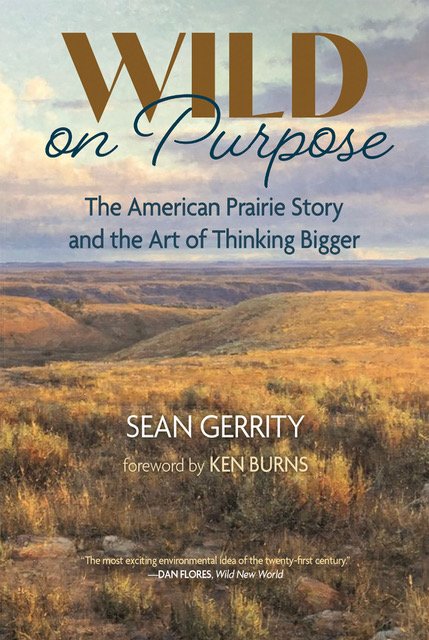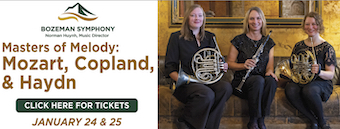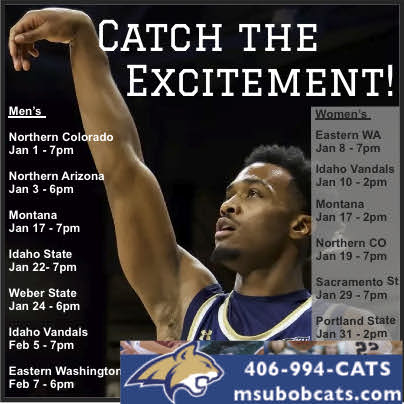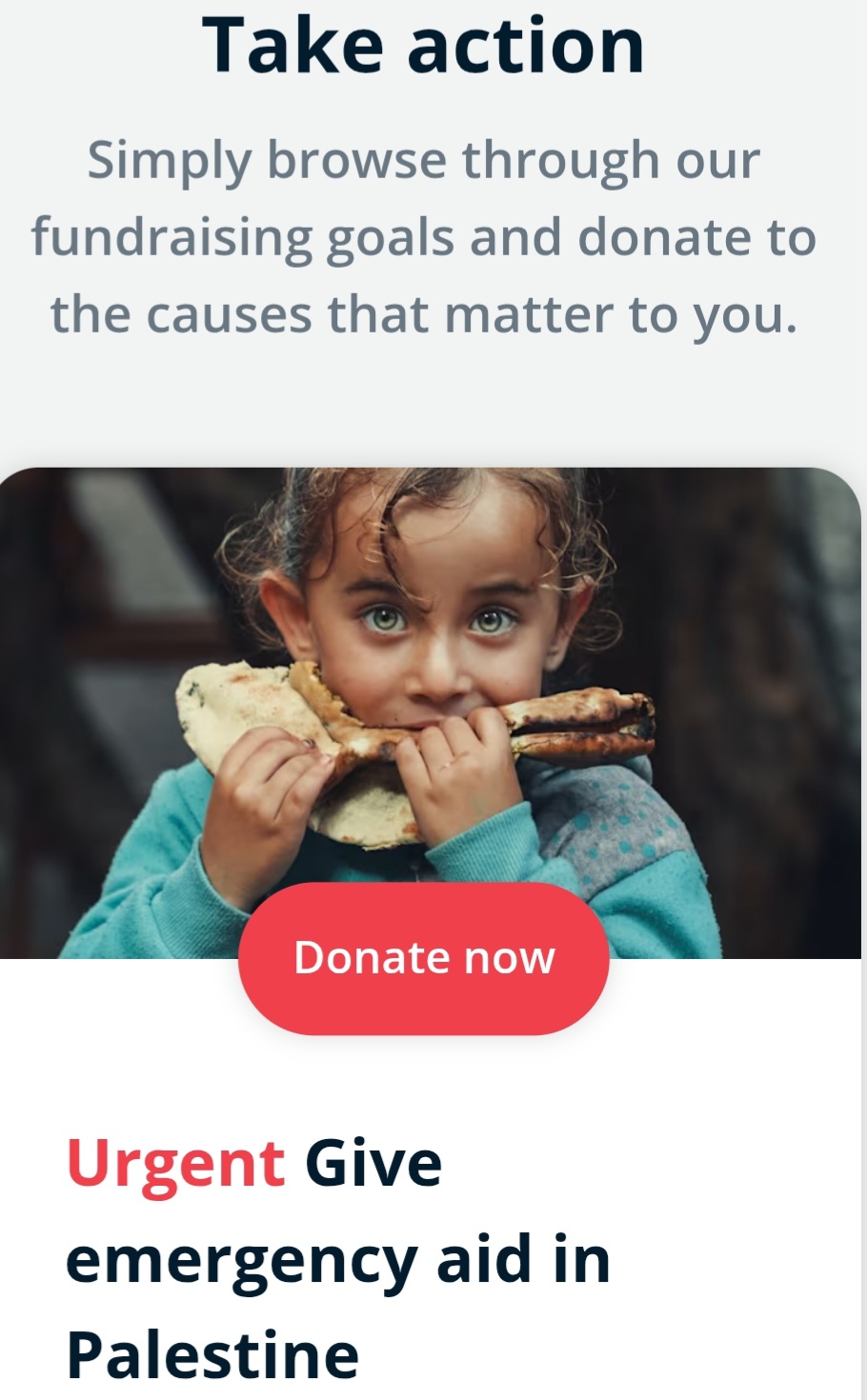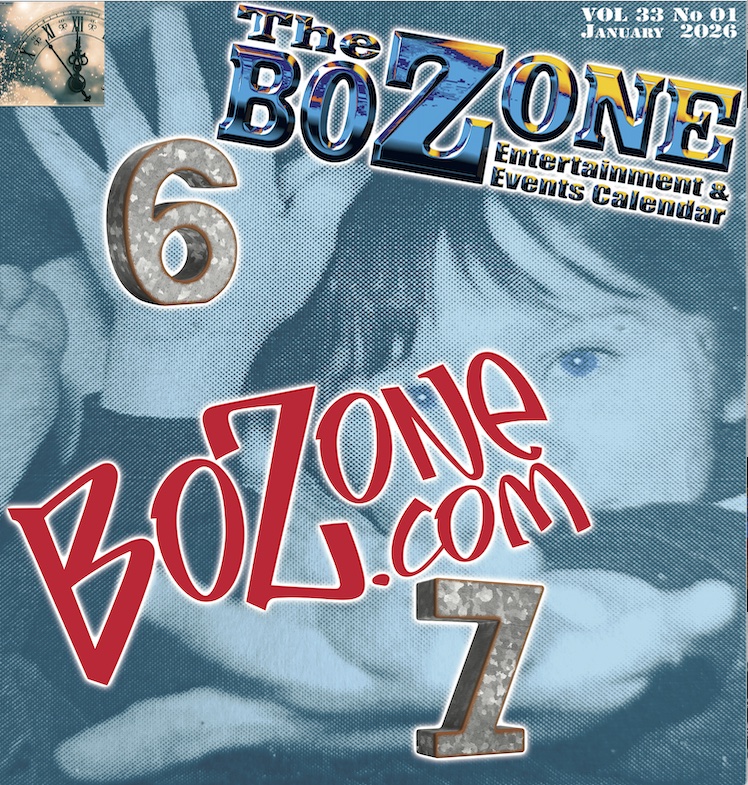Verge production examines a modern apocalypse as it settles into backyards of suburbia
To mark the end of another fantastic season of stage performances (and to help us through the murky seasonal transition that is spring in Montana), Verge Theater brings Matt Lyle’s hilarious and irreverent Barbecue Apocalypse to the black box later this month.
In the play, three couples gather on the back deck of a very modest suburban home for a mid-summer barbecue where the hosts, Mike and Deb, struggle with feelings of inadequacy about their home decor, their clothes, their careers, their culinary skills, and pretty much everything else. Throughout the first act, feelings are hurt over petty gossip, inconsequential concerns, physical slights, and pop cultural deficiencies. The superficial, neuroses-laden interpersonal squabbles bubble over to a flash of inept violence when one of the guests makes what we learn is just one in a series of passes at Deb. As the act closes, the group discovers the rest of the world has been literally falling apart during their little, terrible barbecue.
Act Two takes place on the same deck for another barbecue to celebrate their one-year post-apocalypsiversary. In a year where the only way to measure success is survival, roles have reversed, and we explore how each character’s basic nature has allowed them to adapt and thrive or has pushed them to the brink of extinction.
In anticipation of the Bozeman staging, The Rolling Zone sat down with its Director, Kip Savoie, and Hilary Parker, Executive Director at Verge, to talk the theater’s colorful, contemplative – and perhaps slightly charred – spring offering.
RZ: The upcoming Verge production of Matt Lyle’s Barbecue Apocalypse opens at the “Little Black Box on the Edge of Bozeman” late this month and runs through mid-May. At base, what is this story about?
KS: The shortest synopsis I can give is that it’s about a group of backyard barbecuers who come to discover that a cataclysmic event can change their perspective on social anxieties that are typical in suburban life.
HP: What is success in the apocalypse?
KS: What does that look like?
HP: One of the things I like most about this script, and I’m really interested to see what Kip does with it in terms of staging, is that there’s a lot of anxiety on that stage. The rhythm of how it’s written clearly strings you along. Then the worst possible thing happens and, strangely, there’s some resolution within the characters. People find strength out of tragedy. We know from our personal lives that that’s true. And yet this play delivers that meaningful message in a way that’s so very funny.
RZ: Heavy on cultural references, what does Verge hope audiences will take away from this hilarious, adult-skewing tale?
HP: I want them to feel good about our ability to cope with change. Mike and Deb, two of the main characters, are amazing change agents. They are getting it done in the apocalypse. I’d like to think I would do that too and that I’d keep my sense of humor. I hope people come and they just enjoy it, remembering that the little things in life are just little things and that we’re stronger as a community when we work together.
KS: My number one priority is that people leave laughing, having fun. It’s a darkly comedic tale. I want them to laugh and have a good time while we deconstruct society and examine what it means to be successful in suburban life these days. What if your friends have more money and dress better than you? Does that matter at the end of the day —
HP: — at the end of the world?
KS: Yeah, at the end of the world. [laughs]
HP: That depends. How well can you skewer a raccoon? This is a test.
KS: When the rubber hits the road…
RZ: When you’re hungry, you’re hungry! So, Barbeque Apocalypse has fun comparing the world we live in now with its setting post-cataclysm. Why does this comparison work as a means of social commentary?
KS: The post-apocalypse is very equalizing in a way. Suddenly, your position in a backyard barbecue gathering doesn’t matter so much as compared to your neighbors. You have other things to think about. That’s an important fact to bring home to a lot of people, that this constant jockeying for social position maybe isn’t as important as you think it is.
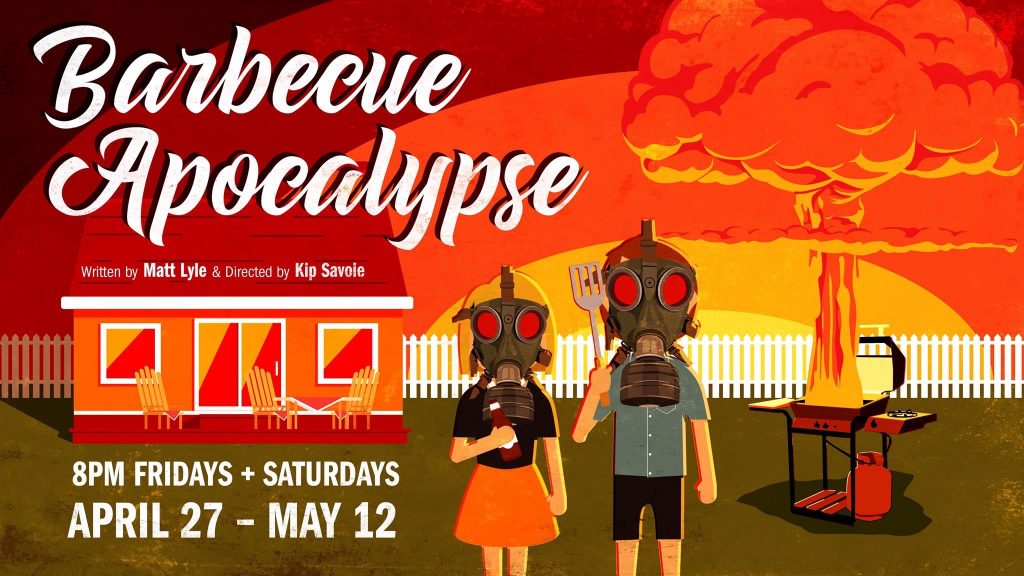
RZ: Why is this idea of living in a “dystopia” so popular these days?
HP: I read a lot of dystopian fiction. It helps me relax. And I know that sounds crazy, but if you take a worst-case scenario and you’re with the characters working through it, there’s something oddly comforting there. I think it lets us exercise the part of our brain that gets worried when we see today’s headlines. We must be attracted to this literature in some way, shape, or form as a part of preparation… just in case, whether we know it or not. It’s also fun and thrilling.
RZ: Despite the “social” aspects of the digital age, we seem to be living in an isolating time when people, like at least one of Lyle’s characters, are glued to a screen. Why is, say, heading down to the Black Box with friends an important experience to uphold?
HP: I read an article recently in which scientists had observed that when people are sitting in a theater watching a performance, their heartbeats synchronize. I thought, “C’mon, that’s poetry but not fact.” No, there’s the footnote and the research behind it. It’s because you’re having an actual shared experience — mentally, emotionally, and physically. The Black Box is the only room where I’m not tempted to look at my phone. I love that this takes me completely out of myself and into something that you create every night, together with the people on stage. Because it’s so intimate here, we get a chance to participate — even as audience members, because you’re laughing or you’re gasping or you’re doing Rocky callouts. It’s one of the last places that grabs you by the collar and says, “You will be present here. You will give of yourself here. You will not be distracted here.” We need more places like that.
RZ: Kip, give us a peek into your directing style. What do you ask of your performers as they prepare to entertain and educate local audiences?
KS: First of all, I was really lucky to assemble an extremely talented cast that I’m super excited to be working with. They’ve brought a lot of enthusiasm and creativity to the process. As much as possible, I love to harness that and collaborate on the direction of the show to see what I get naturally rather than dictating. Everybody brings a different energy and a different perspective. You take the best of all that and meld it together into, hopefully, something beautiful. I think that’s what we’re doing here. We’ve been having a good time and I’m very encouraged.
HP: We’re really excited Kip is helming this show. He’s fantastic, his actors like him, and he’s very easy to work with. He even finds his own props sometimes! He’s a working director as opposed to the ascot-type director, which we like.
RZ: One reviewer of the original Texas staging wrote, “A good comedy makes you laugh. A really good one makes you think.” Though Verge isn’t comedy-exclusive, this idea of entertainment paired with education really seems to complement what this theater is all about.
HP: Definitely. Verge is a community that puts process ahead of product. When we come together in these little families to make a play or to participate in a class, we’re really here to learn from each other and to put an emphasis on radical inclusion of everybody. Come here, be who you are, enjoy your castmates, classmates and instructors, and work with great material. But again, the emphasis is on how we do it as a community rather than, “Ok, we’re going to nail this spot, nail this cue.” Yes, there are absolutely beautiful things that happen here, but it’s not because we say “this will be beautiful and this will be ‘Art’ with a big A.” We get the best performances out of people because they know they’re loved here. I know that sounds cheesy, but it’s just true. I’ve seen it time and time again. People feel so at ease and welcome, and we get amazing creativity out of them because of that confidence.
KS: They’re given respect and support and they’re allowed to stretch themselves and experiment a little bit. I think that you’re surprised by some of the transformations that occur here.
RZ: For those who’ve never been to the Verge or haven’t been to a play in a long time, why is Barbecue Apocalypse the first or next they should see?
KS: I’ll say it’s a smart, well-written, sharp, funny-as-hell show that shows off a lot of the best of what community theater can be when you’ve got a great cast of people together.
RZ: Without giving too much away, what’s been your favorite element of this production?
KS: I’m a big fan of some of the physical comedy that goes on in the show. Again, I’m fortunate to have cast members that are adept at that sort of comedy. There’s some great physical gags and I love the writing. Matt Lyle did an extraordinary job. The dialogue is super smart, sassy, and funny.
HP: My favorite element in prepping this play also brings us back to the value of community: Barbecue Apocalypse has a couple set pieces that are a little unusual. The biggest lift was the ham radio. How do you find a ham radio? It turns out that a parent of one of our former teen class participants is in a Montana ham radio organization and is allowing us to borrow one, and is even willing to coach Kip or the actor through how to look like we’re using it correctly. That’s a great example of the big C “Community” in community theater. It’s not just the people on the stage or even in the tech booth, it’s that everybody comes together and says, “Oh. You need a grill? You need some lawn chairs? We’ll loan you this.” In that way, it kind of resembles an old-fashioned barn raising where everybody comes together and makes things happen. What we can do together is greater than what any individual can do, and there are echoes of that in this script. Surviving isn’t just what you kill and eat, it’s who you are while you’re doing it and it’s the hope that you bring to your life regardless of the circumstances.
RZ: It’s been another great season for Verge, from The Producers and I Am My Own Wife to A Thousand Winds, plenty of stage improv, and some great youth theater. How would you reflect on the season and what can we expect once summer hits?
HP: I think the Verge community did what it always does, what it’s really good at, which is coming together and making amazing, fun productions. This place is hopping three or four nights a week. It’s insane. And it’s growing because of it in terms of the classes we offer and the acting opportunities. I’m so grateful to be able to help steer, even the littlest bit, so people have more collaboration opportunities. We’re definitely going to be full of those next season, so watch for that. We do still have some improv coming up, but Barbecue Apocalypse marks the end of our formal season. Then we’re going to go into summer, which I can’t say much about yet. If you like what you’ve been seeing, then expect more of that, but also some new things. Stay tuned!
Barbecue Apocalypse runs Fridays and Saturdays at 8pm, April 27th through May 12th. Tickets are $14 in advance, or $16 at the door. Visit www.vergetheater.com for reservations and further information about these and other upcoming productions. Advance tickets are also available in store at Cactus Records. See you at “The Little Black Box on the Edge (of Bozeman)!” •

